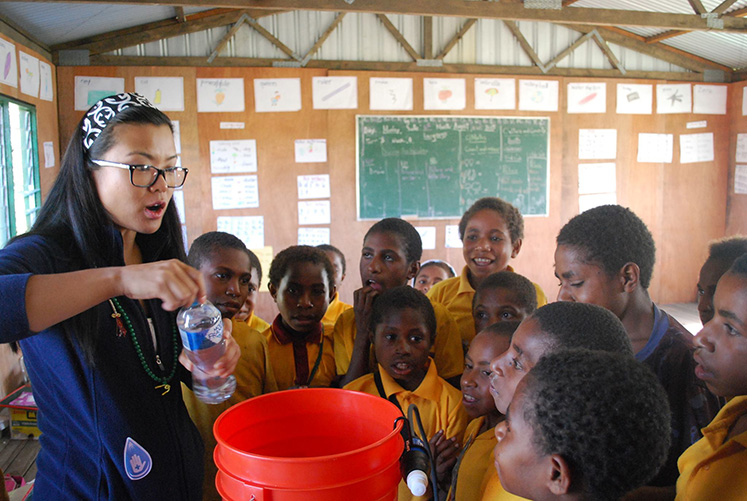Doctoral Student Uses Design Thinking to Empower Teachers in WASH Curriculum Design
Khendum Gyabak worked to build a curriculum infrastructure around proper sanitation using a Water Sanitation and Hygiene (WASH) toolkit
It didn’t take technology for Khendum Gyabak to make a difference in a small village in Papua New Guinea. Her impact started with a song.
Gyabak is a Ph.D. candidate with the Instructional Systems Technology (IST) department. She was the recipient of the Jerrold E. Kemp IST research award, which enabled her to travel to Papua New Guinea to study. She had been invited there by a friend, Dr. James Ham, An ER physician in the United States, who founded the Water Hands Hope non-profit to bring clean water filters, prosthetic hands and provide medical assistance in PNG. The non-profit was partnering with a local non-government organization that had received a Rotary International grant to build toilets and clean water facilities in the community health center in the village of Warike and neighboring community schools around the village, and needed an education specialist to help out with developing a curriculum for the schools. Gyabak became that specialist.

Gyabak is design researcher in education and has an interest in how teachers as designers could empower under-served schools and communities around the world. She has worked on similar research projects in Bhutan, but became interested in traveling to PNG when she discovered the challenges related to sanitation. By designing this project as a community driven effort, She intended to empower community teachers to join her in co-designing a context-suitable curriculum for their classrooms. This direction addressed issues of relevancy and sustainability that was faced by the efforts to bring WASH curriculum by the doctors and missionaries in the past. WASH stands for Water Sanitation and Hygiene, a major effort led by UNICEF to eradicate global health problems that stems from poor sanitation and hygiene practices.
“Tribal culture trumps the rule of law in Papua New Guinea. This is even more evident in the rural areas where issues related to land and community matters is typically resolved by the chief of the tribe,” Gyabak noted. “In the Warike village, the chief of the Warike people was heavily involved with the efforts made by the local NGO, and it was important to get the chief on board because without his endorsement of the pilot project, it would be difficult to get the people from the community involved in the project.”

She traveled to PNG in the summer of 2015, where she lived in the village of Warike, visited four elementary schools in the village, and surveyed the school facilities for toilet and hand washing. She worked to build a curriculum infrastructure around proper sanitation using a WASH toolkit.
The final outcome of the curriculum design workshop was the teacher’s resource manual. The uniqueness of the manual included using re-usable materials to complete activities that were readily available in the village’s natural surroundings. For example, due to the unavailability of water supply in the village homes, most villagers have empty soda bottles to collect water from the nearby Waghi river. In one of the activities in the manual, teachers could re-use soda bottles to bring clean and dirty water from their homes and demonstrate this to their students. Gyabak also helped spread the message of good hygiene through a song she co-wrote and had one of the teachers translate it into Tok Pidgin, the local dialect.
“I think the biggest surprise was actually seeing on of the teachers who was involved in the project teach her children the hand washing song,” Gyabak said. “After all the challenges we faced, I felt a sense of pride and accomplishment that day when I made a surprise visit to one of the schools and seeing the children singing and dancing to the song.”
Gyabak will use the project to continue studying how teachers can be empowered as designers and become active change agents in addressing issues of equity and access oftentimes encountered in highly under-resourced schools. She is currently writing a design case to publish in the International Journal of Designs for Learning and hopes the case will serve as a frame of reference for educators, design researchers and non-profits as they work in similar partnerships in the developing world.
Besides being a Ph.D. candidate with the Instructional Systems Technology department, Gyabak is an instructional designer at the University of Wisconsin-La Crosse.
